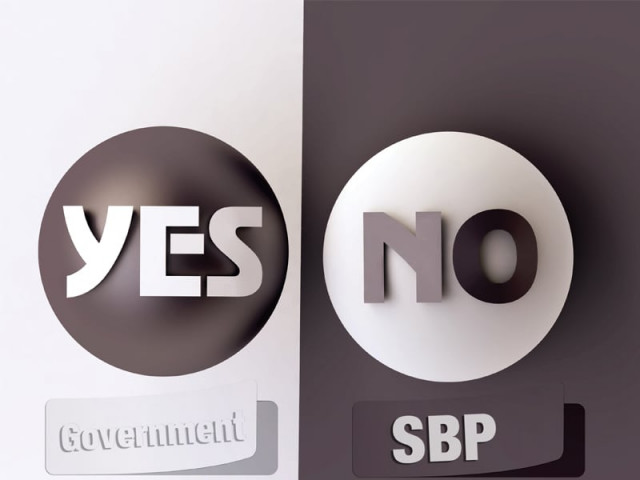Fiscal tightening: SBP opposes debt swap with commercial banks
PM proposed deal to parliament as solution to circular debt.

State Bank of Pakistan on Thursday opposed the debt swap deal with commercial banks, warning the federal government to stop ruining the private sector as the country’s budget deficit widened to 4.5 per cent or Rs932 billion in the first half of the financial year.
The same day, despite the comments by the SBP, Prime Minister Yousaf Raza Gilani presented the proposed debt swap deal as a solution to the circular debt while giving a policy statement on the economy in the Parliament.
Sources said the SBP raised its concerns in a meeting of Monetary and Fiscal Coordination Board - the statutory body framed to align monetary and fiscal policies that so far have been moving in opposite directions.
The meeting was chaired by the Finance Minister Dr Abdul Hafeez Shaikh and attended by Governor SBP Yaseen Anwar, Commerce Minister Makhdoom Amin Fahim and Deputy Chairman Planning Commission Nadeemul Haque.
Sources privy to the meeting revealed to The Express Tribune that the Governor State Bank Yaseen Anwar said that due to reckless borrowings the monetary policy has become neutral and private sector risks being left with no credit.
They added the governor also conveyed his reservations about the government’s move to strike a deal with commercial banks to swap Rs163 billion debt with them at rates even higher than the Karachi Interbank Offered Rate.
The sources also said that the Finance Ministry briefed the Board that according to provisional estimates from July through December the current fiscal the budget deficit - gap between income and expenses - soared to Rs932 billion or 4.5 per cent of Gross Domestic Product. This also includes Rs390 billion electricity and commodity debt arrears of the last fiscal year. Excluding the arrears the deficit remained at approximately 2.7 per cent.
The Finance Ministry officials were not available for comments.
In the first 6 months, the borrowing from the SBP amounted to Rs123 billion, Rs43 billion higher than the borrowing in the same period last year. The federal government not only failed to retire the entire borrowing at the end of the second quarter but also breached the overall debt stock limit that increased to Rs 1,277 billion. From the commercial banks the government borrowed Rs 315 billion in the first half.
The Finance Ministry admitted that risks to the budget are many. They include a delay in disbursements of Coalition Support Fund, delay in 3G license auction, impending receipts from Etisalat, the level of success in achieving the Rs1,952 tax target, increasing subsidies on electricity and provinces’ inability to generate budget surpluses, said the sources.
The sources said the governor SBP further said that the government’s targets of current account deficit, budget deficit and revenues (both tax and non tax) “are very ambitious”. They added, both the Governor SBP and the Commerce Minister Makhdoom Amin Fahim agree that this year the exports will shown negative growth - a view the Finance Ministry is not ready to accept.
As the exports are dwindling the Finance Ministry has come with novel solution. As against shipments-based date of Pakistan Bureau of Statistics, it has presented the receipts-based data that is projecting higher exports. On shipment based data exports in the first half grew 3.9 per cent while the growth is 9.4 per cent on basis of receipts. It fed the same figures to the premier for projecting rosy picture of the economy on the floor of the National Assembly on Thursday.
Published in The Express Tribune, January 20th, 2012.



















COMMENTS
Comments are moderated and generally will be posted if they are on-topic and not abusive.
For more information, please see our Comments FAQ